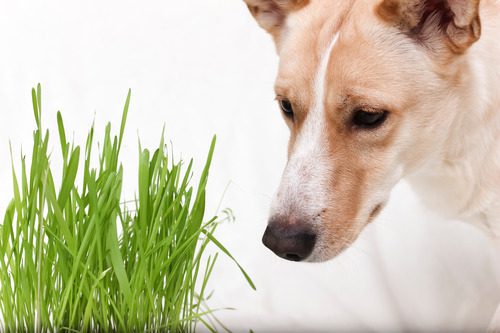Is Your Dog Eating Grass: Causes And What To Expect
Dogs do a lot of quirky things that leave their owners scratching their heads, and one of the most common is eating grass. You might catch your dog casually munching on a lawn during a walk or frantically gulping down grass in the backyard. This behavior can feel confusing, especially when it’s followed by vomiting or an upset stomach. You may wonder: Is your dog eating grass because something’s wrong, or is it just a weird habit? The answer isn’t always clear-cut, but several explanations can help make sense of it. In this blog, we’ll explore the most likely reasons behind grass-eating behavior, when it could signal a problem, and what to expect if your dog keeps going back for more.

Is Your Dog Eating Grass? Here’s What It Could Mean
Seeing your dog chew grass can be surprising, but it’s more common than you might think. While the behavior can sometimes raise red flags, many dogs eat grass without any sign of illness. Researchers and veterinarians have studied this habit for decades, and although no single explanation applies to every dog, several leading theories have emerged.
Instinctive Behavior
Dogs may eat grass due to natural instincts inherited from their wild ancestors. In the wild, canines consumed the stomach contents of herbivorous prey, which included grasses and plants. This behavior may have carried over into domestic life, even if your dog’s food bowl is full. Grass might provide sensory or textural satisfaction that appeals to your dog’s instincts—even if it offers little nutritional value.
Boredom or Attention-Seeking
Sometimes, dogs eat grass simply because they’re bored or looking for stimulation. If your dog has limited access to enrichment activities like walks, toys, or social time, nibbling on grass might be their way of staying occupied. In other cases, grass-eating might be a learned behavior that gets attention from you—even if that attention is concern or correction. Dogs often repeat behaviors that result in interaction.
Digestive Upset
It’s commonly believed that dogs eat grass to make themselves vomit when they feel nauseous. While this isn’t true for every dog, some do show signs of an upset stomach before eating grass and vomiting shortly afterward. If your dog is eating grass and then throwing up frequently, it may be worth discussing the behavior with your veterinarian. It’s not always a cause for concern, but it could point to something that needs further evaluation.
When Should You Be Concerned?
While grass-eating alone doesn’t always point to a medical issue, certain patterns can suggest something more serious. Understanding when to take the behavior seriously can help you stay proactive and protect your dog’s health. If you’re wondering, “Is your dog eating grass more than usual or showing other signs of illness?”, keep reading!
Vomiting More Than Once
Occasional vomiting after eating grass might not be a big deal. However, if your dog vomits repeatedly, seems lethargic, or refuses to eat, it’s time to take action. Persistent vomiting can quickly lead to dehydration or signal an underlying gastrointestinal issue that needs medical attention.
Changes in Appetite or Behavior
If your dog’s grass-eating is accompanied by a sudden change in appetite, weight loss, or behavioral shifts such as restlessness or withdrawal, these signs shouldn’t be ignored. A dog that starts eating grass obsessively could be dealing with discomfort or stress that goes beyond normal behavior.
Presence of Parasites or Toxins
Ingesting grass from areas treated with pesticides, herbicides, or fertilizers can put your dog at risk. Similarly, parasites or harmful bacteria present in soil or plants can contribute to digestive upset. If your dog shows signs of illness after eating grass in a public or treated area, contact your local veterinary emergency team.
Nutritional Considerations and Grass-Eating
You might also wonder whether grass-eating has anything to do with diet. Some pet owners believe their dog turns to grass because something is missing from their meals. While this can sometimes be true, it’s rarely the sole explanation. Still, nutrition does play a role in overall behavior and digestive health.
Fiber Intake
Dogs on low-fiber diets may be more likely to eat grass. Fiber supports digestion and can help regulate bowel movements. If your dog has irregular stools or seems uncomfortable after meals, evaluating their fiber intake may be helpful. Your veterinarian can recommend dietary changes that meet your pet’s needs more effectively.
Gut Health and Microbiome
Emerging research suggests that gut health impacts many aspects of a dog’s well-being, including appetite and cravings. A dog with an imbalanced gut microbiome might engage in unusual eating behaviors. While grass itself won’t correct gut imbalance, the behavior might signal the need for a closer look at your dog’s overall digestive health.
Could Stress or Anxiety Be a Factor?
Is your dog eating grass during thunderstorms, car rides, or while you’re away from home? Emotional stress or anxiety can lead to behavioral changes, including compulsive grazing. Like chewing or licking, eating grass may provide short-term relief for anxious dogs, even if it doesn’t offer any nutritional benefit.
Separation Anxiety and Environmental Triggers
Dogs with separation anxiety might engage in repetitive behaviors, including grass eating, as a way to self-soothe. Environmental changes like a recent move, the arrival of a new pet, or increased household activity can also contribute to stress-related behaviors. Observing when and where the grass-eating occurs may reveal emotional triggers worth addressing.
Behavior Modification
If grass-eating appears linked to stress, your veterinarian may recommend working with a trainer or behaviorist. Enrichment activities, daily routines, and calming strategies can all reduce anxiety-driven behavior. In some cases, medical treatment may be part of the solution, depending on your dog’s needs.
What to Expect If Your Dog Keeps Eating Grass
If your dog eats grass occasionally and otherwise seems healthy, there may be nothing to worry about. Still, you should stay alert to any changes in frequency, symptoms, or behavior following grass consumption. Ongoing observation and timely communication with your vet can go a long way in addressing potential concerns before they escalate.
What a Veterinary Exam May Involve
Your veterinarian may ask about your dog’s diet, behavior, vomiting frequency, and overall health history. They may recommend a physical exam, bloodwork, fecal testing, or imaging depending on what they find. This approach helps rule out digestive issues, infections, parasites, or toxin exposure that could be contributing to your dog’s behavior.
Avoiding Treated Lawns and Parks
Whenever possible, steer your dog away from grass in public spaces or areas treated with chemicals. Lawn treatments, antifungals, and weed killers can all be harmful when ingested. Stick to pet-safe zones or your own untreated backyard to reduce the risk of accidental exposure.
Helping Your Dog Thrive with Healthy Habits
If you’ve been asking, “Is your dog eating grass and should I be concerned?” you’re asking the right questions. While this behavior is often normal, it can sometimes signal something more. By staying observant, promoting a balanced routine, and seeking veterinary guidance when needed, you can help your dog feel their best. If you’re seeing patterns that raise concerns or if your dog isn’t acting like themselves, The Village Vets – 24 Hour Emergency in Atlanta is here for you. Call us anytime at (404) 371-9774 for expert care and peace of mind.

